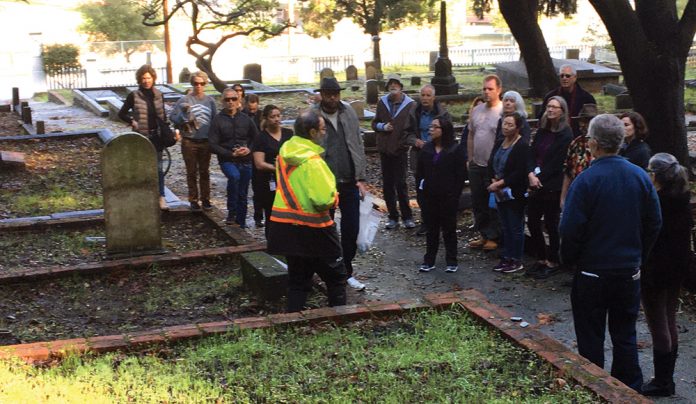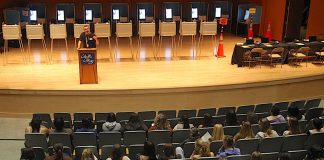
SANTA CRUZ—For two decades, Santa Cruz County has held a ceremony to remember the homeless people who died during the year.
The annual Homeless Persons’ Memorial Day has long been a somber occasion, often marked by stories of the deceased people. Too often, it is the only ceremony they get.
About 80 people gathered at Harvey West Park Thursday morning to honor the 58 who died while homeless.
But even with the ceremony, advocates say it is still easy to forget the dead, particularly with no fixed location—such as a grave—where people can visit.
That’s set to change soon with a new memorial, which will be located at a small spot in the heart of Evergreen Cemetery. It is shaded by ancient trees and surrounded by graves that date to the 19th century.
“This memorial event happens every year, but the rest of the year there is no place to mark the passing of those experiencing homelessness in the community or come to remember them in the way that many people choose to have a place to be remembered,” said Sibley Simon, who serves on the museum’s Evergreen Cemetery Committee.
The Santa Cruz Museum of Art and History, which owns the cemetery, discovered the unused plot and contacted the family that owns it. That family, which still lives in the county, was unaware they still owned it and gave permission to use it, Simon said.
The location has a particular significance. Parts of the cemetery, he said, once served as a potter’s field, a place where paupers and strangers were historically buried.
It is not yet clear what the memorial will look like. That will be up to a group of artists commissioned for the project.
A handful of people spoke during the ceremony about the people they knew.
Food Not Bombs founder Keith McHenry talked about Desiree Quintero, who was killed in the Pogonip area on Oct. 27 when a redwood tree fell on her tent.
Quintero was at the center of a lawsuit against the city by a group of homeless people that was fighting to stay at an unsanctioned camp at River Street, and in many ways has become the public face of their plight.
She was killed in a remote, illegal campsite after the city forced her and more than 200 people out of the twice-closed Ross Camp.
“She went to Pogonip to find safety, and she was crushed by a redwood tree,” McHenry said.
McHenry chided city and law enforcement officials, and implored them to abolish police tactics such as confiscating tents and other survival gear when breaking up illegal camps.
“We could have prevented many of these deaths if the city had the political will to address the crisis,” he said. “We must act, and not have these memorial services year after year after year.”
Evan Morrison, who manages the Paul Lee Loft shelter for Housing Matters, spoke about James Glass, who he met while doing outreach to veterans.
Morrison described Glass as a “really sweet guy” who was struggling to get off the streets. Glass committed suicide earlier this year.
“It broke my heart, and it broke my team’s heart,” Morrison said.
Antoinette Martinez, who said she was homeless for five years, gave a short, tear-filled speech about Charles Miller, who was the father of her son. Thursday would have been his 45th birthday.
“I know he had his issues, but he was a good, kind-hearted person,” Martinez said.










